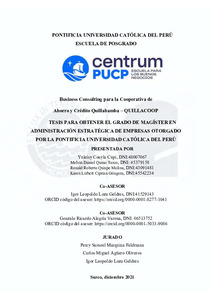| dc.contributor.advisor | Loza Geldres, Igor Leopoldo | |
| dc.contributor.advisor | Alegría Varona, Gonzalo Ricardo | |
| dc.contributor.author | Coayla Cupi, Yuleisy | |
| dc.contributor.author | Quino Tarco, Melvin Daniel | |
| dc.contributor.author | Quispe Molina, Ronald Roberto | |
| dc.contributor.author | Ciprian Góngora, Karen Lizbett | |
| dc.date.accessioned | 2021-12-06T18:03:01Z | |
| dc.date.available | 2021-12-06T18:03:01Z | |
| dc.date.created | 2021 | |
| dc.date.issued | 2021-12-06 | es_ES |
| dc.identifier.uri | http://hdl.handle.net/20.500.12404/21095 | |
| dc.description.abstract | El sector financiero peruano integra dentro de sus entidades no bancarias a las
Cooperativas de Ahorro y Crédito, entidades que aprovecharon el escenario económico
emergente de la región Cusco para incrementar su participación en el sector microfinanciero
de la región, esto antes de la pandemia ocasionada por el COVID 19, existiendo en la
actualidad 55 Cooperativas de Ahorro y Crédito no Autorizadas a Captar Recursos del
Público (COOPAC), de las cuales la COOPAC Quillabamba - QUILLACOOP, es la única
con clasificación modular 3 y nivel de operaciones 2 en la región. Esta empresa presenta un
nivel patrimonial por encima de las 65,000 UIT y en el año 2018 logró una cartera activa de
S/212,848.636 con indicadores de rentabilidad ROE y ROA negativos de -2.14% y - 0.17 %
respectivamente, producto de una utilidad de ejercicio negativa de -549,373 soles. Ante este
escenario, se reconoce como problema clave la baja rentabilidad de la empresa.
El presente Business Consulting, tiene como objetivo implementar la alternativa de
solución que permita incrementar la rentabilidad de QUILLACOOP en el corto plazo; para
ello se realizó el análisis del entorno externo e interno de la empresa y las causas que generan
el problema clave, con el uso de la herramienta del Diagrama de Ishikawa. Con el uso del
emparejamiento de la Matriz FODA, se identificaron 14 estratégias para la búsqueda de
posibles soluciones; y a través de la herramienta Impacto – Esfuerzo de la metodología
Desing Thinking, se identificó la solución más viable, la cual está basada en el
implementación de un aplicativo móvil que le brindará a la empresa una utilidad anual de
S/905,946.56, incrementando sus indicadores de rentabilidad ROE en 2.07% y su ROA en
0.17% en un año, respondiendo así también a la necesidad de implementar nuevos productos
activos digitalizados que permitan a QUILLACOOP incrementar sus ventajas competitivas
en el sector microfinanciero así como salvaguardar la integridad física de sus socios. | es_ES |
| dc.description.abstract | The Peruvian financial sector integrates into its non-banking entities the Savings and
Credit Cooperatives, entities that took advantage of the emerging economic scenario of the
Cusco region to increase their participation in the region's microfinance sector, this before the
pandemic caused by the COVID 19, there are currently 55 Savings and Credit Cooperatives
not Authorized to Capture Resources from the Public (COOPAC), of which COOPAC
Quillabamba - QUILLACOOP, is the only one with modular classification 3 and level of
operations 2 in the region. This company has an equity level above 65,000 UIT and in 2018 it
achieved an active portfolio of S / 212,848,636 with negative ROE and ROA profitability
indicators of -2.14% and - 0.17% respectively, as a result of a negative fiscal year profit of -
549,373 soles. Given this scenario, the low profitability of the company is recognized as a
key problem.
The present Business Consulting, aims to implement the alternative solution that
allows increasing the profitability of QUILLACOOP in the short term; For this, the analysis
of the external and internal environment of the company and the causes that generate the key
problem was carried out, with the use of the Ishikawa Diagram tool. Using the SWOT matrix
matching, 14 strategies were identified to search for possible solutions; and through the
Impact - Effort tool of the Desing Thinking methodology, the most viable solution was
identified, which is based on the implementation of a mobile application that will provide the
company with an annual profit of S / 905,943.56, increasing its indicators of ROE
profitability of 2.07% and its ROA of 0.17% in one year, thus also responding to the need to
implement new digitized active products that, for QUILLACOOP, increase its competitive
advantages in the microfinance sector as well as safeguard the physical integrity of its
partners. | es_ES |
| dc.language.iso | spa | es_ES |
| dc.publisher | Pontificia Universidad Católica del Perú | es_ES |
| dc.rights | info:eu-repo/semantics/openAccess | es_ES |
| dc.rights.uri | http://creativecommons.org/licenses/by-nc-nd/2.5/pe/ | * |
| dc.subject | Consultores de empresas--Planificación estratégica | es_ES |
| dc.subject | Microfinanzas--Crédito--Cuzco | es_ES |
| dc.subject | Aplicaciones--Dispositivos móviles | es_ES |
| dc.subject | COVID-19 (Enfermedad) | es_ES |
| dc.title | Business Consulting para la Cooperativa de Ahorro y Crédito Quillabamba – QUILLACOOP | es_ES |
| dc.type | info:eu-repo/semantics/masterThesis | es_ES |
| thesis.degree.name | Maestro en Administración Estratégica de Empresas | es_ES |
| thesis.degree.level | Maestría | es_ES |
| thesis.degree.grantor | Pontificia Universidad Católica del Perú. CENTRUM | es_ES |
| thesis.degree.discipline | Administración Estratégica de Empresas | es_ES |
| renati.advisor.dni | 41529143 | |
| renati.advisor.dni | 06513752 | |
| renati.advisor.orcid | https://orcid.org/0000-0001-8277-1041 | es_ES |
| renati.advisor.orcid | https://orcid.org/0000-0001-5033-9086 | es_ES |
| renati.author.dni | 48007067 | |
| renati.author.dni | 45379158 | |
| renati.author.dni | 43091481 | |
| renati.author.dni | 45542234 | |
| renati.discipline | 413307 | es_ES |
| renati.juror | Marquina Feldman, Percy Samoel | |
| renati.juror | Agüero Oliveros, Carlos Miguel | |
| renati.juror | Loza Geldres, Igor Leopoldo | |
| renati.level | https://purl.org/pe-repo/renati/level#maestro | es_ES |
| renati.type | https://purl.org/pe-repo/renati/type#tesis | es_ES |
| dc.publisher.country | PE | es_ES |
| dc.subject.ocde | https://purl.org/pe-repo/ocde/ford#5.02.04 | es_ES |






